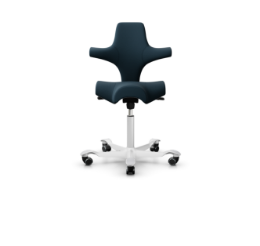Unpacking workplace stress
Stress is not a foreign concept in the workplace; neither is sitting at a desk for several hours at a time or having back-to-back meetings throughout the day. If you are feeling stressed or overwhelmed throughout the workday, you aren’t the only one feeling that way. The American Institute of Stress estimates that 83 percent of US workers suffer from work related stress.
While acute, short-term stress, such as stress surrounding a big presentation or a time crunch on a project, can help you stay focused, workplace stress that continues for extended periods of time takes a bigger toll on your overall health. Long term stress can make you more susceptible to illness and increase your risk for certain health conditions. Some things that contribute to chronic workplace stress are working long hours, poor communication, low levels of recognition and reward, lack of role clarity, high mental task demands, physical inactivity, poor workstation ergonomics and physical work environment. One study looking at how job stress affects mental and physical health found that high-stress work environments were linked to increased trips to the doctor. The last thing you want to add to an already booked schedule is increased trips to the doctor for health issues related to stress.
By taking steps to reduce stress, you can reduce your out-of-pocket healthcare costs, increase productivity, improve mood, increase sleep quality, improve your blood pressure and cholesterol numbers and improve mobility and flexibility.
Invest in healthier workspace ergonomics
Ergonomics is defined as the study of people’s efficiency in their working environment. Workspace ergonomics focuses on creating safe and efficient workspaces. A comfortable workspace can lead to improved health outcomes and less stress on your body. Imagine having a workspace where at the end of the day, your neck and shoulders aren’t feeling stiff and tight! The top of your computer monitor screen should be at or slightly below eye level and directly behind your keyboard. This helps take pressure off your neck and shoulders. You can also look into using a laptop tower stand or a standing desk. These are designed to help you sit less, improve posture, and move your body more throughout your workday. An ergonomic keyboard allows for responsive keystrokes on the lightest touch, relieving any uneeded stress while typing. An office chair that supports your back, has armrests, and allows you to rest your feet flat on the ground will relax your shoulders, help with good posture, and keep your joints comfortable.
Move your body throughout the day
One of the hidden costs of healthcare is physical inactivity. A study published in the Journal of the American Medical Association, reported that the average adult sits 8 hours a day, which can increase the risk of obesity, high blood pressure, high blood sugar, excess body fat around the waist and higher cholesterol levels.
Here are a few things you can do to reduce the amount of time you are sitting throughout the day:
1) Stand up and move around every hour. Using a wearable device like the minder can help you set reminders to do this.
2) Have one of your meetings be a walking meeting.
3) During your lunch break, take a 10–15-minute walk.
4) If you work at an office, take the stairs instead of the elevator.
Make healthier food choices
Stress at work can lead to a higher likelihood of choosing unhealthy foods for lunch, stress eating after the workday, scarfing down your lunch at 2pm after your meeting or a combination of all three. Eating more nutritious food throughout your workday can help your body better handle stress and it will give you more sustained energy. During the workday, having a healthy snack such as a piece of fruit or mixed nuts and a lunch (at lunchtime) with whole foods that contain a variety of carbohydrates, fats and protein will leave you feeling a lot better than a candy bar or burger and fries.
Disconnect from work
With the ability to work from home or have access to work email or phone when you are out of the office, you are constantly available. That constant availability can impact your ability to disconnect from work and make you feel like you are always working. One way to disconnect from work when you are not at the office or are on vacation is to turn off notifications. If you aren’t getting notifications, you are less likely to check your phone or email. Your body and mind need time to recharge, just like your computer does. In this case, unplugging is the best way you can recharge and recover.
Ask for support
When you are feeling overwhelmed, the thought of asking for help can make you feel like you have failed. Communicating how you are feeling can open the door to alternative strategies or additional support. Speaking up about feelings of stress or overwhelm can feel vulnerable. Understand that you aren’t alone in feeling the things you are feeling and that many other individuals are going through similar workplace challenges.
Take things one step at a time
Utilizing some of these strategies on your own or through a worksite wellness program can help you improve your quality of life, workplace satisfaction, productivity and overall health and wellness. From an employer’s perspective, investing in stress management practices and healthy workspaces for employees can reduce healthcare costs, absenteeism, and employee turnover.
In thinking through these strategies and how best to implement them in your situation, remember to take things one step at a time. Don’t try to start all these things all at once. Choose the one that is most aligned with what you are currently struggling with, work through making it a consistent part of your routine and then move on to another strategy.
Sources
Azagba, S., Sharaf, M.F. Psychosocial working conditions and the utilization of health care services. BMC Public Health 11, 642 (2011). https://doi.org/10.1186/1471-2458-11-642
Ussery EN, Fulton JE, Galuska DA, Katzmarzyk PT, Carlson SA. Joint Prevalence of Sitting Time and Leisure-Time Physical Activity Among US Adults, 2015-2016. JAMA. 2018;320(19):2036–2038. doi:10.1001/jama.2018.17797
https://www.stress.org/42-worrying-workplace-stress-statistics















Leave a comment
All comments are moderated before being published.
This site is protected by hCaptcha and the hCaptcha Privacy Policy and Terms of Service apply.